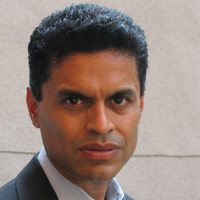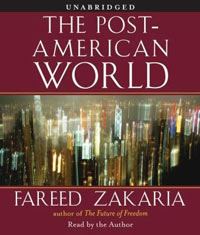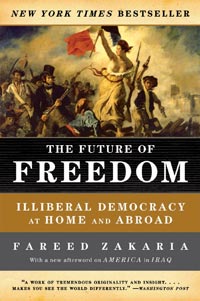Fifteen Minutes with Fareed Zakaria
Influential Political Commentator and Newsweek Editor to Speak at the Arlington
Newsweek International editor Dr. Fareed Zakaria has been called “the most influential foreign policy advisor” of this generation. The host of CNN’s Fareed Zakaria GPS and author of bestselling political books such as The Post-American World, Zakaria will deliver a talk at the Arlington this week on what he theorizes to be this country’s next major security crisis.
Zakaria spoke to me on the phone last week from New York City.

The topic of your lecture in Santa Barbara is The Next Security Crisis: Global Threats and U.S. Foreign Policy. What’s the greatest issue facing our national security? I think the biggest security crisis the U.S. faces in the next five to 10 years is not going on in some sort of mountain in Afghanistan or valley in Iraq, but is really a crisis that is in the heart of the American system. It’s the capacity of the United States to come together, solve deep problems that it faces, and regain its competitive strength and vigor for the 21st century. To me, that is the biggest security crisis the U.S. faces.

What role do U.S. foreign policy and global threats play in this security crisis if the problem really lies at home, and its source is systemic? The fundamental source of any nation’s power—military, political—is its economic vitality. One of the things I’m very concerned about is that the U.S., in political and military terms, is dominant. We have hundreds of thousands of troops spread across dozens of bases all over the world. It’s an enormously expensive military establishment. We’re spending $700 billion on defense annually, which is more than the rest of the world put together. Yet, the ultimate source of our power is our economic vitality. You can’t have military power without economic power; you cannot sustain political influence without economic power. So when we think about what it is in the long run that will sustain America’s status and political position internationally, you’re drawn back to this crisis here. It is ultimately a crisis of the American system.

The term “next security crisis” implies that the crisis has not happened yet. Can it be preempted by, say, the Obama Administration’s policies? Or is this something that can only be exacerbated? It can be combated. What we are facing is a very different world, one in which other countries are rapidly rising, in which the ability of jobs to move around the world is unprecedented in human history, in which you have two billion new workers coming on to the global labor force. And in that world, we have to ask ourselves, what is the U.S.’s competitive position, and are we positioned correctly for these new challenges and opportunities? Right now, when you look at any aspect of our public policy, we’re in bad shape. I think the Obama Administration has done many things that have been positive, but in order to deal with what is really a deep systemic crisis, you need both parties to act with a certain kind of bipartisanship and speed to tackle problems.
How does this crisis compare to American security crises of the past? In many ways, it’s much deeper. If you take, for instance, the Iraq War, the Afghanistan war; these are problems, they are deep problems, but they are problems that can be managed by the application of military power or diplomatic persuasion. Over time, wiser diplomacy and more-effective military power can, if not solve the problem, ameliorate it considerably. But here, we’re talking about something much deeper: How do you get the American system back into a long-term growth trajectory? And that requires many, many more things to be in alignment.
You are renowned for your ability to identify political and economic trends. Aside from security crises, what kind of changes do you believe Americans should expect in the coming years? I think the fundamental change that’s taking place is that we are entering a world in which power is distributed more widely than ever before, because countries are becoming more economically vibrant and politically assertive. I think the key thing for America to understand—whether it’s government, businesses, or the American people—is that this is not directed at us; this is not anti-Americanism. This is, fundamentally, other countries becoming more independent and moving from a highly American-dominated world to one in which power is more evenly distributed. I think what this means for Americans is that now we have to compete like everybody else in this new world if we want access, if we want influence. These things are not going be handed to us on a platter because of an enormous preponderance of power, or because of our superpower status. Whether it’s China or the European Union, there are other bidders in the system—and it means we’ve got to play the game, and play it well.
4•1•1
Fareed Zakaria will speak at the Arlington Theatre on Monday, April 12, at 8 p.m. For tickets, call 893-3535 or visit artsandlectures.sa.ucsb.edu.



